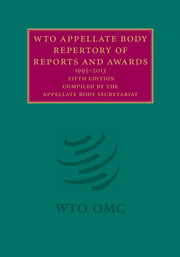Book contents
- Frontmatter
- Contents (outline)
- Contents
- Foreword to the 1995–2013 edition
- List of Abbreviations for Parts I and II
- Part I Appellate Body Reports
- A
- B
- C
- D
- E
- F
- G
- H
- I
- J
- L
- M
- N
- O
- P
- Q
- R
- S
- T
- V
- W
- PART II Arbitration Awards under Article 21.3(c) of the DSU
- Annexes
- Abbreviations used in the Table of References to the Covered Agreements and Other Instruments and in the Indexes
- Table of References to the Covered Agreements and Other Instruments by Article
- Subject Index
- Subject Index by Case (Appellate Body Reports)
- Subject Index by Case (Arbitration Awards under Article 21.3(c) of the DSU)
E
from Part I - Appellate Body Reports
Published online by Cambridge University Press: 05 March 2015
- Frontmatter
- Contents (outline)
- Contents
- Foreword to the 1995–2013 edition
- List of Abbreviations for Parts I and II
- Part I Appellate Body Reports
- A
- B
- C
- D
- E
- F
- G
- H
- I
- J
- L
- M
- N
- O
- P
- Q
- R
- S
- T
- V
- W
- PART II Arbitration Awards under Article 21.3(c) of the DSU
- Annexes
- Abbreviations used in the Table of References to the Covered Agreements and Other Instruments and in the Indexes
- Table of References to the Covered Agreements and Other Instruments by Article
- Subject Index
- Subject Index by Case (Appellate Body Reports)
- Subject Index by Case (Arbitration Awards under Article 21.3(c) of the DSU)
Summary
Enabling Clause. See also MFN Treatment (M.2)
E.1.1 Paragraph 1. See also Burden of Proof (B.3); Request for the Establishment of a Panel, Article 6.2 of the DSU – Claims and legal basis of the complaint (R.2.2)
E.1.1.1 EC – Tariff Preferences, para. 90
(WT/DS246/AB/R)
… By using the word “notwithstanding”, paragraph 1 of the Enabling Clause permits Members to provide “differential and more favourable treatment” to developing countries “in spite of” the MFN obligation of Article I:1. Such treatment would otherwise be inconsistent with Article I:1 because that treatment is not extended to all Members of the WTO “immediately and unconditionally”. Paragraph 1 thus excepts Members from complying with the obligation contained in Article I:1 for the purpose of providing differential and more favourable treatment to developing countries, provided that such treatment is in accordance with the conditions set out in the Enabling Clause. As such, the Enabling Clause operates as an “exception” to Article I:1.
E.1.1.2 EC – Tariff Preferences, paras. 101–102
(WT/DS246/AB/R)
… the text of paragraph 1 of the Enabling Clause ensures that, to the extent that there is a conflict between measures under the Enabling Clause and the MFN obligation in Article I:1, the Enabling Clause, as the more specific rule, prevails over Article I:1. In order to determine whether such a conflict exists, however, a dispute settlement panel should, as a first step, examine the consistency of a challenged measure with Article I:1, as the general rule. If the measure is considered at this stage to be inconsistent with Article I:1, the Panel should then examine, as a second step, whether the measure is nevertheless justified by the Enabling Clause. It is only at this latter stage that a final determination of consistency with the Enabling Clause or inconsistency with Article I:1 can be made.
- Type
- Chapter
- Information
- WTO Appellate Body Repertory of Reports and Awards1995–2013, pp. 443 - 476Publisher: Cambridge University PressPrint publication year: 2014



